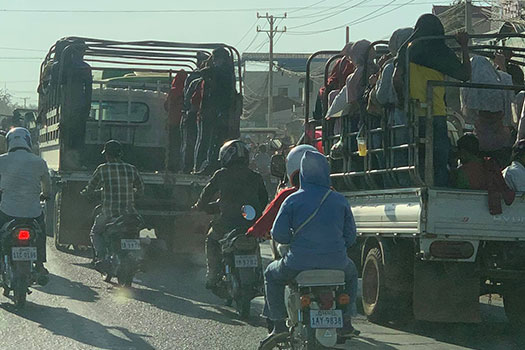Cambodia’s first confirmed case of Covid-19 was about a month later than the first confirmed case in Wuhan, China. The first case was from a Chinese man who came to visit Cambodia on 27 January and the second case was on 7 March 2020. As of 28 April 2020, there were 122 confirmed cases (with 119 recovered) within 13 out of 25 provinces and capital, with three major hotspots including Sihanoukville with 40 patients, Phnom Penh 28, and Kampong Cham 16. It should be noted that more than half the cases were foreigners (especially from France), a fraction was local transmission, and all cases were with mild conditions.
During the early period, the myths surrounding the Corona Virus were not strange, especially in an age of social media which plays a huge role in shaping our thoughts and belief. Many items of information and news are posted on a daily basis, and some of these can be false. In Cambodia, there are many myths concerning corona prevention such as eating chicken eggs, drinking wine (alcohol), putting onions inside nostrils, rinsing mouths with salted water, and many more. One of the most controversial discussions on the virus was when the government allowed the MS Westerdam to dock in Sihanoukville Port (after it was refused by five other ports) on 14 February 2020, and subsequently welcomed by Prime Minister Hun Sen with flowers. At the time, people believed that the cruise ship could spread the virus to local communities. Between the first to the second case, the public did not trust the health authorities and believed that there would be community transmission. Any unconscious ailments on the street or public places, people attributed to the corona virus causes and this led to public fear. Given that there was no panic buying or runs on food suppliers, the prices of facemasks and hand sanitizers surged. There have also been many cases where venders are selling fake products online without recognition and permission from the Ministry of Health.
Cambodia has taken major safety precautions to keep this pandemic under control. On Tuesday March 17, Cambodia suspended entry into the country from nations such as the United States, France, Germany, Italy, and Spain. Moreover, on March 18, 2020, the government closed all non-essential services such as museums, cinemas, concert halls and bars. To date, large religious gatherings are prohibited until further notice. The Ministry of Health has assigned three hospitals in Phnom Penh (including a Five Star Hotel), and 25 Provincial Hospitals as medical facilities that can order a test for, and treat, suspected cases of COVID-19. Additionally, there have been thermal scanners and quarantine teams at three international airports in Phnom Penh, Siem Reap, and Sihanoukville, as well as at border checkpoints. According to Health Minister Mam Bunheng, Cambodia has around 670 medical doctors to help tackle the viral pandemic. Furthermore, the Prime Minister has stated that Cambodia had prepared some 3,000 makeshift hospital beds across the country by commandeering schools and purchased more than 5 million face masks for healthcare workers and people. Additionally, the Ministry of Education has issued an immediate, indefinite, closure of all schools until further notice.
Seeing the threats of this pandemic, Cambodia wanted to put the country into the State of Emergency but there was no law to support this or activate it except an article on the State of Emergency in the Constitution. Without this Law, the government had no other choice but to issue an Official Announcement to restrict the movement of people, in particular, garment workers during the Khmer New Year Celebration mainly to curtail travel from one province to another. This restriction was for 1 weeks. The Government, then, drafted a Law on the State of Emergency which was adopted on the 29 April. 2020.
While the country has not had any deaths or new infections in the past few days and has already cured many, the challenge remains the same. The Ministry still urges Cambodian citizens to take extra precautions for the benefit of not only themselves, but also their family members and our country as a whole.
Given the nature of this pandemic, Cambodians have shown a high level of solidarity in fighting the virus. First, individuals (from rich to poor households, from a million dollars to a few hundred) have contributed money to the Government. Second, there were many government officials (from the Prime Minister to civil servants) who have contributed their salary ranging from 7 months to fewer at the Ministry of Health. Third, many generous families have packed food supplies and meals for poor in urban areas. As a result of this, to date, in Cambodia, people have followed government instructions very well.
30 April, 2020
- 1 This piece is solely by the author and does not reflect the opinions of their institution.
Nyda Chhinh is a lecturer at the Royal University of Phnom Penh.
Citation
Nyda Chhinh. 2020. “Cambodia: An Optimistic Country Amidst a Global Pandemic” CSEAS NEWSLETTER, 78: TBC.


